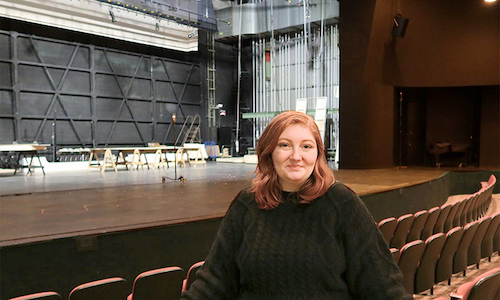by Jarrett Hoffman

•Announcements: Modern Snare Drum Competition announces winners (pictured along with the judges), deadline for KSU’s Roy Minoff Composition Competition, and a Low Brass Excerpt Fest at University of Akron
•Interesting read: a student’s initiative to bring sensory inclusivity to BW
•Almanac: Iannis Xenakis, life intersections with his Pléïades, and “playing ugly”
ANNOUNCEMENTS:
The Modern Snare Drum Competition has announced the winners of the 2024 event, held last week at the Cleveland Institute of Music. In Division 1, first place went to Kevin Chen (Northwestern University), second to Kai Gray (Eastman School of Music), and third to Albert Mackey (CIM). And in Division 2, first place went to Ning Tie (Juilliard School) and second to Jack Spelman (University of North Texas), while third was a tie between Tristan Toma (CIM) and Tristan Boyer (Temple University).
The application deadline for this year’s Roy Minoff Composition Competition is June 1. The competition — which supports the creation of a new work to receive its world premiere at Kent State University in fall 2025 in a performance by Glauser School of Music faculty — is open to composers of all ages, and there is no entry fee. Learn more here.
Also on June 1, the University of Akron School of Music will host a Low Brass Excerpt Fest, celebrating trombone parts in orchestral repertoire through masterclasses, recitals, vendors, a participant ensemble, and a mock audition competition. The trombone section of the Toledo Symphony will be featured as guest artists. Registration is free, as is participation in the competition portion of the event — sign up here.
INTERESTING READ:
An article last month from Baldwin Wallace Conservatory centers around the efforts of student Taylor Lang to make BW’s theaters certified as sensory-inclusive, “offering accommodations that can benefit individuals with autism, dementia, PTSD and other conditions.”
The initiative was part of Lang’s senior thesis for the BW Honors Program. “Through my research, I found out about a national organization called KultureCity, which provides guidance and support in implementing sensory-inclusive accommodations for organizations,” she said. “Through our partnership with KultureCity, our front-of-theatre house staff will receive training, and the University will receive signage and supplies that align with sensory accommodation.” Read the article here.
TODAY’S ALMANAC:
by Mike Telin
May 29, 1922 saw the birth of composer and architect Iannis Xenakis in Brăila, Romania. A musical experimentalist, his 1953-54 Metastaseis for orchestra includes an independent part for every musician. As an author, his theoretical writings include Formalized Music: Thought and Mathematics in Composition, and as an architect, he designed the Philips Pavilion at Expo 58 in Brussels.
Xenakis was responsible for significant works for percussion including Psappha (1975), Persephassa (1969), and Pléïades (1979), the latter two having been premiered by the venerable ensemble Les Percussions de Strasbourg. Click here to listen to a recording of Pléïades performed by that ensemble and here to listen to an interview with the composer. In 2011, as part of their North American tour (I happened to have been the tour manager), Les Percussions de Strasbourg performed Persephassa and Pléïades at Alice Tully Hall at Lincoln Center. Read the New York Times review here.
On a personal note, I remember when Xenakis came to Oberlin for a residency in November of 1981. As a member of the Contemporary Music Ensemble, I had the privilege of working with the composer, who introduced me to the concept of “playing ugly.” I cannot remember the title of the piece, but I do remember it having a wicked bassoon part that spent a good deal of time in the instrument’s highest register. I was frustrated — and so was he.
Finally during a rehearsal break Xenakis came to me and asked, “Why are you trying to make it sound beautiful? It’s supposed to be ugly.” That advice pretty much solved the problem. It was during that same residency that the Oberlin Percussion Group gave the U.S. premiere of Pléïades — and my fascination with music for percussion ensemble and my love for contemporary music was born.




